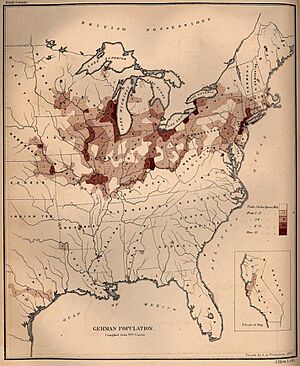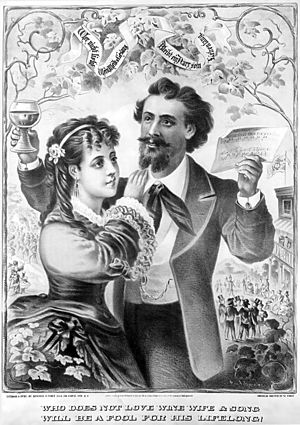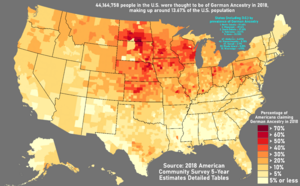Germans in Omaha, Nebraska facts for kids
Germans started moving to Omaha, Nebraska, when the city was founded in 1854. Many came after the Revolutions of 1848 in the German states, which were a series of protests and rebellions in Germany. More Germans arrived in the late 1800s and early 1900s, especially from Bavaria and southern Germany.
These German immigrants played a big part in Omaha's culture, social life, and politics. By 1890, about 23% of Omaha's population was German. By 1910, more than half (57.4%) of the city's 124,000 people had German roots.
By 1930, when the Great Depression began, fewer Germans were moving to Omaha. Even though Germans were the second-largest group of foreign-born people after Czechs, they made up less than one percent of the city's total population.
German immigrants and German Americans in Omaha were often well-educated. Many working-class Germans supported several newspapers printed in German. These newspapers were read locally and across the country. Germans also built and ran successful breweries in Omaha, bringing their skills and love for good beer to the Midwest. The German way of public education also influenced schools in the Midwest.
Valentin J. Peter (1875-1960) was the editor of the German-language newspaper Omaha Tribüne. He helped create and lead the Nebraska branch of the National German-American Alliance. This group was important in representing German Americans across the United States from 1912 to 1940.
When World War I started, Peter supported Germany and encouraged other German Americans to do the same. However, before the U.S. joined the war in 1917, he changed his mind and supported the U.S. and its allies. He also supported the U.S. and its allies during World War II after the attack on Pearl Harbor.
Contents
History of Germans in Omaha
The first known German in the Omaha area was Prince Maximilian of Wied-Neuwied. He visited the Missouri River region in 1832, more than 20 years before Omaha was founded. He stayed at Cabanne's Trading Post in what is now North Omaha.
When many Germans started arriving in Omaha in the 1860s, they built their own churches. They often spoke German in their churches and businesses, like grocery stores and farm shops. Many young German immigrants from Omaha fought in the American Civil War for Nebraska.
One early German settler was Vincent Burkley. He changed his name to sound more English. After working as a grocer and farm helper for three years, he opened his own printing company in 1854. He quickly became successful. Burkley was elected to the Omaha City Council and the Omaha Board of Education for several years.
German Communities in Omaha
In early Omaha, many Germans lived between South 10th and 13th Streets. Here, they could buy food from German shops like Volkmier's Meat Market and Schmid's Grocery. There was also the Schube Haus (a bakery) and hotels like the Emmel House.
German Catholics settled south of the railroad and west of South 16th Street. Their community was around South 16th Street and Center Street. They built St. Joseph's Church in 1887 for German-speaking Catholics. Protestant Germans settled near South 11th Street and Center Street, building a German Methodist Episcopal Church in 1886.
By 1900, Germans lived in more areas, including the Near North Side, Florence, and South Omaha. Within 25 years, they lived all over the city, with many in the Dundee and Field Club neighborhoods. Another group lived near South 19th and Vinton Streets. This area had shops like Bongardt Meat Market, Schmidt Saloon, and Muller's Hall.
German Culture in Omaha
Germans built several Deutschekirchen (German churches) in Omaha. St. Joseph's was a Catholic church started in 1901 for German-speaking Catholics.
The German community in Omaha was large and educated enough to support several German-language newspapers. These included the Omaha Tribune, the Volkszeitung Tribune, and the Sonntagspost, which later became the AmericaHerold.
Edward Rosewater, an editor at The Omaha Bee, used the phrase "Germania our Mother, Columbia our Bride." This described how many Germans in America felt loyal to both their home country and their new country. In the early 1900s, German immigrants came to Omaha for work and to escape harsh rule by Kaiser Wilhelm in Germany.
The German community in Omaha quickly settled across the city. Some German immigrants and their children were slow to fully blend into American culture. In the early 1900s, Germans in Omaha successfully pushed for German culture, German history, and German language lessons to be taught in local public schools. This was because they were a large part of the voting population.
German Employment in Omaha
Germans in Omaha worked in many of the city's factories. They were especially important in the brewing industry, which German immigrants started. Major German breweries in the city included the Metz Brewery, Krug Brewery, and the Storz Brewery. Gottlieb Storz, Frederick Krug, and Frederick Metz made their breweries successful by hiring German brewers and workers for their skills.
Many Germans in the Omaha area also worked at the Union Stockyards (a large livestock market) and in farming in Douglas County. In 1910, the Union Stockyards reported that 14.1% of its workers were German immigrants. Many Germans also worked at German-owned beer gardens, dry goods stores, and milling operations. The German work ethic was highly respected in Omaha. Immigrant workers from Germany were easily hired in Jobbers Canyon and by the railroads in Omaha.
National German-American Alliance
In July 1910, Germans in Omaha joined with other immigrant groups to create the National German-American Alliance. At their first meeting, at least 54 social, farming, and cultural groups from around Omaha were represented. This alliance brought many German organizations together in July 1911 at the city's annual Sängerfest. This was a dance and gathering for over 5,000 people. By mixing their political goals with a German cultural event, the Alliance leaders could make the event political without much notice from the main newspapers.
Bavarian-born Valentin J. Peter was the publisher of the German-language newspaper Omaha Tribüne. In 1914, Peter led the National German-American Alliance in strongly opposing women's suffrage (the right for women to vote) during a statewide election. The Omaha Tribune editor said that giving women the right to vote was mainly "to introduce state prohibition with the help of these women's voices."
In the years before the U.S. joined World War I, tensions in Europe were felt in the U.S. During a 1915 speech to the National German-American Alliance, Valentin Peter said that the enemy was the same both in Europe and America. He felt that England was turning European countries against Germany and that the U.S. press was unfairly criticizing everything German.
Such strong pro-German feelings from German immigrants caused some Americans to feel anti-German. Many Americans favored the British as allies. In 1916, the Vice-President of the National German-American Alliance openly criticized President Woodrow Wilson for actions that seemed to favor the Allies at the start of the Great War.
World War I and German Americans
When World War I began, some Americans worried about the loyalty of German immigrants and their families. A movement against immigrants grew in Omaha. The U.S. government used laws called the Alien and Sedition Acts against German citizens. Germans who were not U.S. citizens had to register with the government as "Alien Enemies". Even though Valentin Peter had supported Germany earlier, by the time the U.S. entered the war, he strongly supported the U.S. fighting alongside Great Britain.
Strong anti-German feelings spread in Nebraska because of the war. German books were destroyed. The state government made laws that stopped people from speaking foreign languages in public or on the phone. Schools were also not allowed to use or teach foreign languages below the eighth grade. Some people took strong actions against German immigrants during wartime.
When the United States joined the war, most businesses and churches stopped using German. They did not want to seem disloyal to the U.S. This feeling spread throughout Nebraska.
After World War I
Anti-German feelings led to a state law in 1919 that said all teaching must be in English. The law stated: "No person... shall... teach any subject... in any language than the English language." Robert Meyer was found to have broken this law because he taught German. He was taken to court by the State of Nebraska. His appeal to the Nebraska Supreme Court failed. However, the U.S. Supreme Court in the case Meyer v. Nebraska decided that Meyer had the right to teach the German language.
By 1919, open discrimination against Germans was happening in Omaha. Many German-language newspapers had to switch to English or close down.
World War II and German Americans
By the time of World War II, there were few first-generation German immigrants left. German Americans had national leaders who sometimes gave different political messages. This showed the wide range of opinions among German Americans as they became more a part of American life. Many German Americans were fully integrated into American society. By World War II, many of the special German groups and places in Omaha, like stores, German-language churches, and social clubs, had disappeared or welcomed people from other backgrounds.
Legacies of Germans in Omaha
The experiences of German immigrants in Omaha and Nebraska are said to have greatly influenced the writer Willa Cather. She wrote about how Germans blended in, faced discrimination, and built communities in some of her stories.
The person who invented the Reuben sandwich was a German American who lived in Omaha. Val Peter's company, the Interstate Printing Company, is still run by the Peter family in Omaha today. The Volkszeitung Tribune was a German-language newspaper published in Omaha from the late 1800s until the 1980s. A German Old People's Home, a place for elderly people of German background, was in Omaha for almost 100 years. It was run by a group of trustees, all descendants of German immigrants.
Current German Influence
St. Joseph's Catholic Parish, located at 1723 South 17th Street in South Omaha, still has many members of German heritage.
The German-American Society, located at 3717 South 120th Street in West Omaha, continues to hold regular events. They teach German traditions and celebrate special holidays. Its location in a more suburban area shows how German Americans have become a part of the wider community over time.
Notable Germans and German-Americans in Omaha
| Notable Germans and German-Americans in Omaha (Alphabetical) | |||||
|---|---|---|---|---|---|
| Name | Born/died | Connection to Germany | Connection to Omaha | Notability | |
| Adele Astaire Adele Austerlitz |
1896–1981 | Daughter of German father | Born in Omaha | American dancer and entertainer | |
| Fred Astaire Frederick Austerlitz |
1899–1987 | Son of Austrian father | Born in Omaha | American film and Broadway stage dancer, choreographer, singer and actor | |
| Max Baer | 1909–1959 | Son of German Jewish parents | Born in Omaha | Onetime Heavyweight Champion of the World American boxer, actor and entertainer | |
| Marlon Brando | 1924–2004 | German ancestry | Born in Omaha | American actor | |
| Frederick Krug | 1855–1930 | Volga German | Kratzke, Russia | Founder of Krug Brewery | |
| Charles O. Lobeck | 1852–1920 | Born to German father and Swedish mother | Lived in Omaha | Democratic U.S. Representative from Nebraska from 1911–1919 | |
| Frederick Metz | 1832–1901 | Immigrated from Hesse-Cassel, Germany in 1851 | Lived in Omaha | Co-founded Metz Brewery in 1864 | |
| Nick Nolte | 1941- | Grandson of German | Born in Omaha | American actor | |
| John Louis Nuelsen | 1867–1946 | Born to German parents | Served in Omaha from 1908-1912. | Bishop of the Methodist Episcopal Church | |
| Conor Oberst | 1980- | German ancestry | Born and raised in Omaha | American indie singer | |
| Valentin J. Peter | 1875-? | Bavaria | Lived in Omaha from 1907 to death | Publisher and editor of Omaha Tribune | |
| Joseph Rummel | 1876–1964 | Immigrated from Baden, Germany in 1882 | Served as bishop of the Diocese of Omaha from 1928–1935 | Archbishop of the Archdiocese of New Orleans | |
| Nicholas Sparks | 1965- | German ancestry | Born in Omaha | American author | |
| Gottlieb Storz | ?-1939 | Immigrated to U.S. from Württemberg, Germany in 1870 | Lived in Omaha | Founded Storz Brewery in 1876 | |
 | William L. Dawson |
 | W. E. B. Du Bois |
 | Harry Belafonte |




